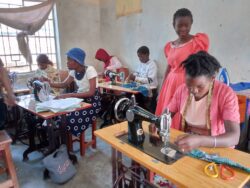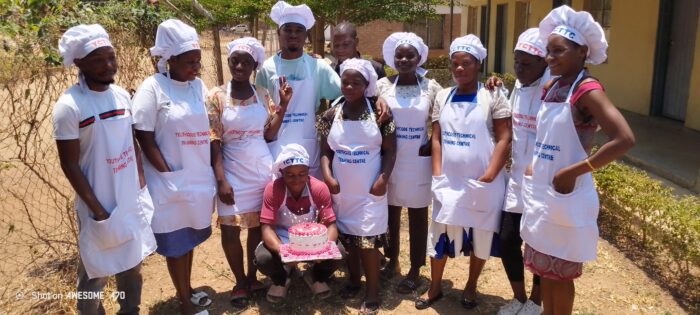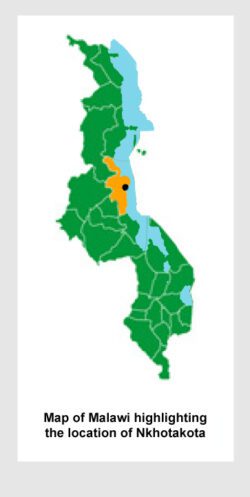

In May 2025, 51 graduates of our Vocational Training project with Malawi partner, Youth Code, will move into our phase 2 project, Transition to Work. Now equipped with technical skills in either Tailoring, Solar Installation & Electrical Repair, Metal Fabrication & Welding or Food Production, our trainees will start to apply their theoretical knowledge as they establish their own solo enterprises or form business groups.
Supporting our newly qualified graduates is critical if they are to succeed. From practice job interviews, writing business plans, managing customer records and book-keeping, our Transition to Work project will provide graduates with the skills and confidence to enter a competitive job market.

Caroline Vundika during her metal fabrication training in November 2024
Last year, 55 young men and women aged 18 – 24 years were selected for enrolment on our ‘Skills for Jobs’ Vocational Training project with YouthCode. Trainees completed 6 months of skills-based training and 3 months of work-placement experience to acquire an all round grounding in their chosen trade, either Tailoring, Solar Installation & Electrical Repair, Catering or Fabrication & Welding. Trainees were assessed by the Technical, Entrepreneurial, Vocational Education and Training (TEVET) Authority and awarded a with nationally recognised qualification. Each graduate received a start-up tool kit to ensure they had all the equipment they needed to start carrying out their trade. In addition, trainees gained valuable experience by undertaking projects to benefit their communities and showcase their new skills:

Tailoring trainees in July 2024
Tailoring trainees produced and distributed up to 500 sanitary pads to nearby community primary schools. Members of the school staff and Mother Care Group have received training in how to make more sanitary pads in school.
The apprentices in Fabrication and Welding have visited local primary schools to undertake maintenance and repairs of desks, chairs and tables, roofing, etc.
Catering students provided a nutritious free meal service once a week to all students, to promote attendance and encourage their ongoing participation.
51 graduates will now move onto our Year 2 project, ‘Transition to Work’, designed to help graduates bridge the gap between acquiring a trade and using their skills to earn an income. Against a backdrop of scarce jobs, high competition and lack of start-up capital, securing employment or self-employment can be very daunting for newly qualified graduates. By continuing to support them for the first 12 months beyond vocational training, our project will help graduates navigate their own path to building a livelihood. Participants will receive top-up vocational training to fill any technical skills gaps, and will develop confidence in employing key business skills, from managing client relationships to setting prices in response to fluctuating material costs and market demands. They will also receive business start-up grants, high quality career guidance and job-finding services, direct employment linkages with local businesses and mentorship, advice, and guidance to support new business development.
It is anticipated that our Transition to Work project will result in young people taking control of their futures, gaining valuable jobs and life skills, and finding new employment opportunities. At the end of the Year 2 project, it is anticipated that graduates will

Catering trainees were very excited to have baked a cake. Few people have the means to make elaborate birthday and wedding cakes at home, so cake-making is a thriving business opportunity in Malawi.
 Poverty and unemployment are huge challenges in Malawi and the World Bank estimates that in 2023 72% of the population are living in poverty. The unemployment rate is 5.61% (ILO, 2022) and youth unemployment rate far higher at 10%. In Nkhotakota district where our project is based, 80% of the population are below 35 years of age and 51% are under 18. The challenging economic climate has been exacerbated in recent years by external shocks such as the emergence of corona virus, natural disasters, and exponential increases in the cost of living. For many young people, the cost of food, materials, transport and shop rent is far beyond their means. This has resulted in young people being driven into high-risk behaviours such as drug and substance abuse and transactional sex to support themselves.
Poverty and unemployment are huge challenges in Malawi and the World Bank estimates that in 2023 72% of the population are living in poverty. The unemployment rate is 5.61% (ILO, 2022) and youth unemployment rate far higher at 10%. In Nkhotakota district where our project is based, 80% of the population are below 35 years of age and 51% are under 18. The challenging economic climate has been exacerbated in recent years by external shocks such as the emergence of corona virus, natural disasters, and exponential increases in the cost of living. For many young people, the cost of food, materials, transport and shop rent is far beyond their means. This has resulted in young people being driven into high-risk behaviours such as drug and substance abuse and transactional sex to support themselves.
Nkhotakota District Council is striving to open opportunities in the region for agriculture, tourism, and mining. The recent growth in the construction and tourist industries will enable apprentices to secure employment and establish their new businesses. This will open many markets for newly qualified skilled workers. Our project with YouthCode aims to increase the employment prospects for young people in the town of Nkhotakota who may otherwise seek for more high risk and less sustainable ways to earn a living. Through training in market-ready vocational skills coupled with essential business and life skills, we will support these young people in entering the labour market, enhance personal and household incomes and utilize their newly learnt skills to enrich local communities.
Projects such as these would not be possible without you. If you would like to support our life-changing projects, please click here to give a one-off gift or set up a regular donation. Thank you.
April 2025